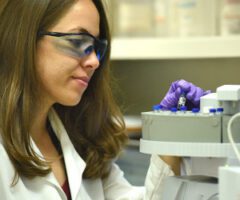From its inception, SRI International was structured to encourage collaboration between scientists across disciplines. This approach has generated many groundbreaking discoveries and technologies over the years.
Recently, SRI created and launched an internal competition for innovative, forward-thinking projects that leverage this successful, collaborative model while also furthering SRI’s mission to create world-changing solutions making people safer, healthier, and more productive.

All SRI researchers within 5 years of receiving their degree were invited to submit project proposals. As a post-doctoral fellow conducting research in SRI Biosciences’ medicinal and synthetic chemistry team, I saw this invitation as a tremendous opportunity to apply my own and SRI’s vast antiviral drug-discovery expertise to address the emerging Zika virus crisis. The Zika virus is expected to spread to up to 4 million people by the end of 2016 and has been linked to severe birth defects among babies born to women who were infected while pregnant.
The organization received a wide variety of great submissions addressing important topics, including autism, robotics, and environmental protection. Fortunately, the SRI leaders who evaluated the proposals saw the potential impact and promise of our proposal and awarded my team the funds to move forward.
There are three basic strategies available to fight Zika: eliminate mosquitoes, develop vaccines, or design effective antiviral drugs. All three of these approaches will be important in fighting the spread of Zika and its devastating consequences; however, SRI has numerous key assets that give the organization a head start on the third approach.
SRI’s Biosciences division has a long history of expertise in antiviral drug discovery, biochemical assay development, vector-borne disease research (i.e., diseases transmitted via bugs such as the mosquito), and medicinal chemistry. In fact, our lab, led by Thomas R. Webb, Ph.D., has already developed hundreds of compounds targeting the influenza RNA-dependent RNA polymerase (RdRp). This enzyme has been proven to be essential to viral replication and, in influenza, we know that it mutates more slowly than other common drug targets. This means that it develops resistance to drugs more slowly than traditional antivirals. Because there are significant similarities between many viral RdRps, these compounds have the potential to have broad-spectrum antiviral activity and are a logical starting point if we want to target the Zika virus RdRp.
Our plan is to create a one-of-a-kind chemical library, which we have named the SRI Antiviral Influenza Legacy (SAIL) library, leveraging thousands of drug-like molecules already made by SRI medicinal chemists and specifically designed to target the RdRp enzyme. Simultaneously, SRI Biosciences’ infectious disease team, led by Tom Voss, Ph.D., will develop a first-of-its-kind Zika virus biochemical assay that can specifically evaluate compounds in the SAIL library for RdRp inhibition. Once these two pieces are in place, we will use automated robotic screening to rapidly screen the SAIL library with the Zika assay, looking for molecules that inhibit Zika replication. The structure and culture of SRI make it easy for us to integrate resources and expertise in this way to solve specific problems such as Zika.
We believe that the model we have proposed – combining the SAIL compound library, custom assay and rapid screening – can be replicated for any virus. Our hope is that the Zika project will not only help us identify compounds to treat this devastating illness, but ultimately will create a platform for rapid response to any emerging virus or drug-resistant viral strain.


